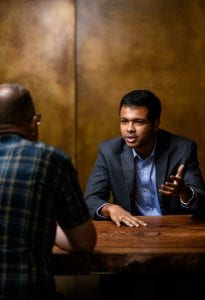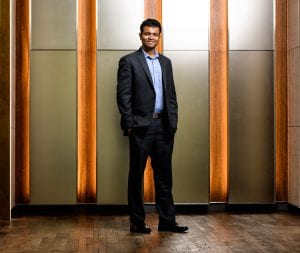Mihir Borkar pursued an MSIS because he wanted to complement the technical knowledge he gained in his undergraduate degree in computer engineering with a broader perspective of the business side of IT.
“The MSIS program at Kelley had the perfect set of coursework for me to advance my education,” said Mihir, who graduated in 2018 and now works for Google Cloud as a technical solutions engineer (TSE). “The courses enable students to look at IT from a strategic mindset, viewing it as a business enabler, while retaining the technical complexity required of a graduate-level program.”
He said the experiential learning opportunities with the Kelley School’s MSIS made it the right choice for him and differentiated it from other academic programs.
“The coursework was designed with learning opportunities—case competitions and capstone projects—that enabled me to work on real-world IT problems with major companies,” he said. “As a part of the internship option, I worked with Cook Medical as a business analyst for almost a year. This was exactly the kind of practical experience I was seeking.”
What Mihir does as a technical solutions engineer at Google Cloud
As a TSE for Google Cloud, Mihir is part of a globally distributed team that provides 24×7 support to help customers seamlessly run their workloads on Google Cloud. He provides solutions by running an accurate diagnosis, troubleshooting problems and identifying the root cause to ensure the problems never crop up again.
His role also involves serving as a subject matter expert for internal stakeholders to improve supportability and resiliency of the company’s products.
Mihir said his work with customers helps them run their operations smoothly and maximize the benefit from their workloads on Google Cloud, which he feels brings a lot of value to his work.
“As a TSE, every problem I tackle is unique and often requires a new line of thinking,” he said. “Arriving at a resolution involves examining different troubleshooting strategies. This keeps me challenged and motivates me to keep expanding on my knowledge.”
Mihir said his MSIS courses prepared him well for his current and future work. Courses such as IT architecture and cloud computing, and IT strategy, for example, were extremely valuable in showing him the basics of cloud computing and how IT is positioned in large globally distributed companies. Instructors encouraged students to discuss their opinions in class.
“This helps develop critical thinking and communication skills that will set you up for a rewarding career no matter where you end up,” he said.
Mihir said he recognized early on that he was “truly passionate” about using technology to solve business problems, specifically in a customer-centric role where he could “empower my customers by simplifying technology.” Understanding his strengths and passion gave him a clear vision of where he wanted to be—he sought out customer-facing positions that relied on technical problem-solving skills.
“I wanted to find a job that I could excel at and at the same time enjoy doing. I also made sure to tap into the existing MSIS alumni network,” he said. “I did not apply to jobs just because they had a ‘great location’ or were considered ‘high in demand.’ I focused on what I was truly passionate about.”
More advice for MSIS students
- Don’t think of business and technology as separate disciplines. Instead, come to Kelley with a mindset to explore the interrelationship between the two.
- The MSIS program is designed to mirror the challenges of a corporate environment. He encourages students to take advantage of this by using it “as a sandbox;” embrace the “fail fast, learn faster” maxim by not being afraid to make mistakes as long as you learn from them.
- One of his key takeaways from the program was learning how to work in teams. This was critical, he said, because success in the workplace often is the result of closely knit teams working well together. At Kelley, he learned how to tactfully communicate and use the skills of persuasion to navigate in a team setting and to drive execution.
Be prepared to take advantage of the experiential learning component of the MSIS program.


Leave a Reply